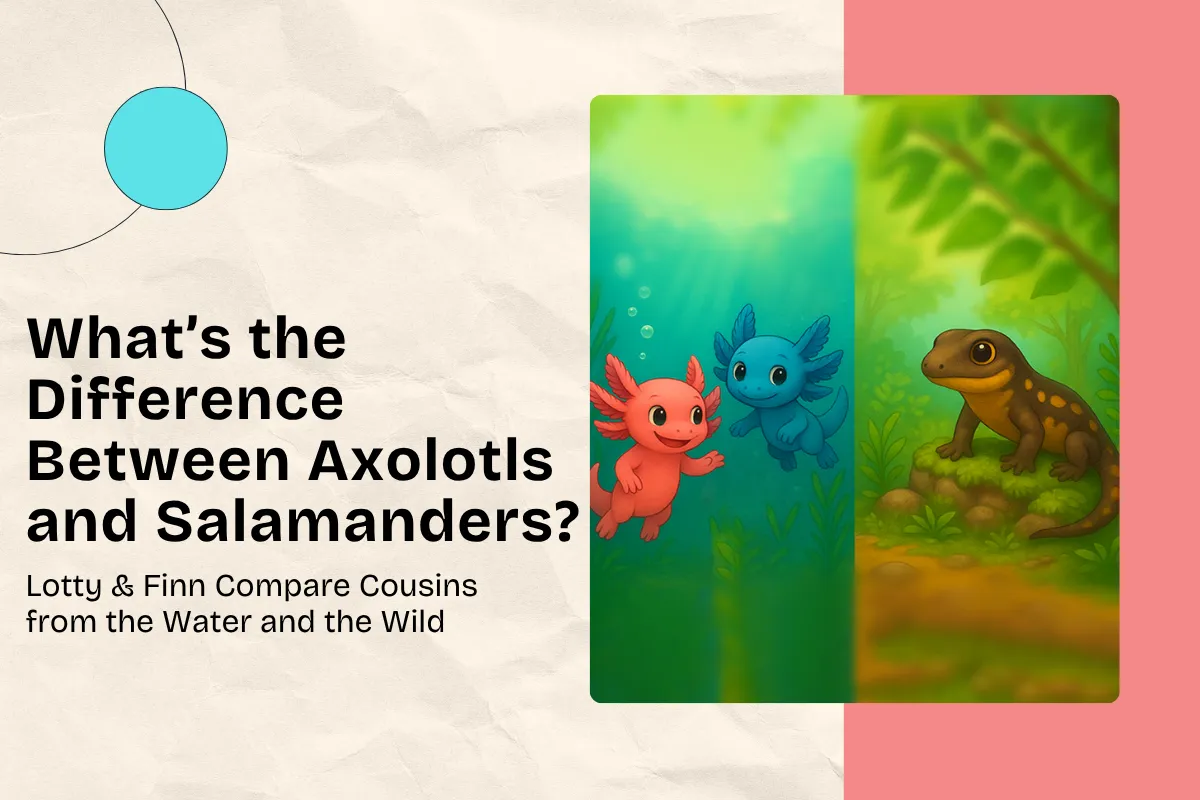
What’s the Difference Between Axolotls and Salamanders?
What’s the Difference Between Axolotls and Salamanders? | Lotty & Finn Compare Cousins from the Water and the Wild
Meet Your Guides: Lotty, Finn & Glowria
Hi, explorers! Lotty here 🩷 and Finn by my side (probably humming again). Today, we’re exploring a question that makes everyone curious: “Are axolotls just salamanders with fancy gills?”
Finn gasps dramatically: “You mean we’re related to salamanders? Like distant cousins who live on land?”
Glowria nods wisely: “Exactly, Finn — same family, but different lifestyles!”
Let’s dive in and see how axolotls and salamanders are alike — and what makes axolotls such special splashy exceptions.
Family Ties: The Salamander Connection 🧬
Both axolotls and salamanders belong to the amphibian family, which means they can live in or around water. Think of salamanders as our adventurous relatives — they grow up underwater, then move to land as adults.
But axolotls? We never leave the water! We keep our soft gills and stay playful and curious under the surface forever. Scientists call this rare trait neoteny, which means “staying young forever.”
Lotty: “We’re basically the Peter Pans of the amphibian world!”
Finn: “Except I prefer singing to flying.”
Axolotl Academy – Science Spotlight 🔬
For curious minds and eager learners, explore more about this topic on our Explorer Resources page.
Axolotls and salamanders share similar body structures — tails, limbs, and moist skin — but they differ in how they grow and breathe.
Salamanders undergo metamorphosis, losing their gills and developing lungs as they mature.
Axolotls remain aquatic, keeping their gills and youthful features for life — a trait known as neoteny.
Axolotls also have remarkable regeneration powers, allowing them to regrow limbs, tails, and even parts of their hearts and brains — a superpower few other amphibians possess.
Key Takeaway: All axolotls are salamanders, but not all salamanders are axolotls. Axolotls are the eternal swimmers — unique, youthful, and full of wonder.

Water vs. Land Life 🌊 vs. 🌳
Here’s a quick comparison to help you tell our families apart:
Feature
Axolotl
Salamander
Habitat
Always lives in water
Starts in water, moves to land
Gills
External feathery gills
Lose gills as they mature
Breathing
Through gills, skin, and lungs
Mostly through lungs and skin
Metamorphosis
Doesn’t occur (neotenic)
Does occur
Regeneration
Excellent
Limited
Personality
Curious, calm, splashy
Shy, quiet, earthy
Finn squints: “So… we’re the water-loving cousins who never grow up?”
Glowria beams: “Exactly — and that’s what makes you glow!”
Why the Difference Matters
This isn’t just a fun family story — it’s an important science lesson! Understanding how amphibians adapt helps scientists protect species, preserve habitats, and study how regeneration might one day help humans heal, too.
Lotty: “Our differences make the ecosystem stronger.”
Finn: “And they make our family reunions very interesting!”
Conclusion – Same Family, Different Lives
Axolotls and salamanders share a fascinating bond — two paths in one family tree. One grows up and explores land, while the other stays forever young in the water.
Glowria sums it up best: “Whether you crawl or swim, every creature shines in its own way.”
Lotty: “And now we know — being an axolotl means never outgrowing your wonder!”

PS: Lotty & Finn live in our imagination, where adventures are full of curiosity and fun! If you’re caring for real axolotls, always check with experts for proper guidance. Curious to dive deeper? Visit our Explorer Resources page for trusted sources and links. 🌊
